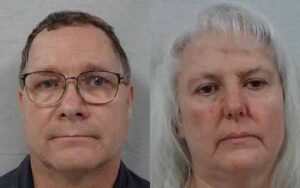
KOH PHI PHI, Thailand (BP)–The damage to the once-gorgeous island of Koh Phi Phi is immediately evident when one steps onto the pier after taking a 75-minute ferry ride from Krabi, Thailand, some 25 miles to the north.
While the destruction of most of the island’s flora and commercial structures is clear, the damage to the hearts and psyches of Koh Phi Phi’s residents is of a magnitude that can only be imagined.
Between 10,000-12,000 people resided on Koh Phi Phi (pronounced “Coe Pea Pea”) on Sunday, Dec. 26, when the first tsunami wave crashed ashore at 10:35 a.m. from the Andarman Sea. More than 2,000 islanders perished in the wall of water brought inland by a series of battering waves. In a few moments, the lives of those who remained were changed forever.
Nine Oklahoma Southern Baptist disaster relief volunteers recently helped Koh Phi Phi survivors sweep away the piles of debris left behind by the tsunami. Amid oppressive tropical temperatures hovering near 100 degrees, the Oklahomans filled wheelbarrows with dust, broken concrete, clothing and other personal effects and hauled the debris to larger piles. Items such as bank books and airline tickets with names on them were turned over to police officials to be returned to victims’ relatives.
The work helped clean off the sidewalks on the island to make it easier for tourists — some of whom actually had begun to appear — to make their way to the few hotels and restaurants which had returned to operation.
The Oklahomans joined in with a small group of volunteers, most of them Europeans in their late 20s or early 30s, to do the work. Several of the Europeans had vacationed on the island at one time and had returned to Koh Phi Phi after the tsunami to help. Others had come to the island for a short visit originally and then had settled there to live and work.
One example was Claire, a native of London, who fell in love with the island.
“I came for a one-day visit and have been here for the past four years,” she said. “This is a very close-knit community. No one can understand what truly happened here if they don’t live on the island.
“We are staying here to see Koh Phi Phi rebuilt. If we had left after the tsunami, our last memories would have been seeing dead bodies everywhere.”
Recovery has been slow since Dec. 26, Claire said.
“Only in the last few weeks has it seemed a lot more positive,” she said, scanning the devastated scene. “The government came three days after the tsunami and collected the bodies, but Koh Phi Phi hasn’t had much help since. So much of the greenery is gone … so many of the palm trees.”
The idyllic island life has been shattered, she said.
“My worst fear used to be getting hit on the head by a falling coconut,” she said in an attempt at humor.
As the Oklahomans worked alongside the islanders, they began to form a bond as the residents recognized their motives for being there.
“They saw our yellow shirts and knew we were Baptists. They seemed to be waiting to see if we were just there to hand out religious tracts,” said team leader Dan Fuller, a member at First Baptist Church in Medicine Park, Okla. “Once we worked hard alongside them for a couple of days, they accepted us.”
That acceptance eventually led to what was perhaps the first Christian worship service ever held on the island, a short service on the beach Sunday, Feb. 13. About 30 islanders joined in. The service was even “advertised” by an announcement in one of the bars on the island Saturday evening.
Randy Gordon, a member at First Baptist Church in Bethany, gave a brief sermon, and the Oklahomans provided worship music by singing “I Saw the Light” and “Amazing Grace.”
Gordon also gave the islanders the opportunity to remember those lost in the tragedy by saying their names out loud. The service ended with the group singing the “Doxology.”
Fuller said the most touching part of the trip for him was the Oklahomans cleaning up an area on higher ground to which many of the islanders had fled after the waves first hit.
“About 400 people spent that first night near what they call a view garden,” Fuller said. “They left behind a mountain of items, including pillows, blankets, towels, clothing, shoes, water bottles, food containers, suitcases and bottles of sleeping pills.
“I was glad we were able to go in and clean it up because the islanders did not want to go back there.”
The Oklahoma disaster relief team left for Thailand Feb. 3 and returned to Oklahoma Feb. 18.
–30–
Bob Nigh is managing editor of the Baptist Messenger, newsjournal of the Baptist General Convention of Oklahoma, online at www.baptistmessenger.com.













